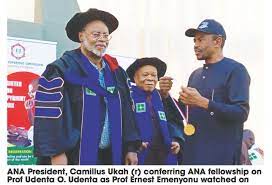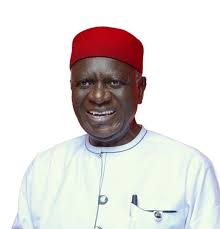5th November 2022 By Henry Akubuiro
The Mamman Vatsa Writers’ Village, located just two kilometres as you ascend the Mpape rocky hill, is one of the major attractions that greets every visitor to one of Abuja’s middlebrow residential areas. It occupies a wide expanse of land, sandwiched between rocks. On a typical day, you would hear the fall of silence from a distance. But, for four days last week (Wednesday, October 26, 2022, to Saturday 29), silence gave way to sonorous voices and plaudits as Nigerian writers converged for its 41st annual convention, daring the US security terror alert.
It was the second time the Chinua Achebe International Conference, the landmark building at the writers’ village, was hosting the cream of Nigeria’s literary community. If last year’s event was like playing to the gallery having emerged from the rift of the previous year, this year’s convention was a test of confidence on ANA’s president, Mr Camillus Ukah, and his “kinetic” team. How, then, was the kinetic surge from the Mpape hills?
Abuja harmattan breeze said hello to all and sundry, to begin with, and delegates and visitors to the Mamman Vatsa Writers’ Village noticed some changes from the last time. There was a functional secretariat named after one of the founding members of the association (Femi Osofisan National Secretariat) within the spawling complex. A new library, ANA Library and Research Centre, was located upstairs.
The biggest surprise was the completion of a two-winged block housing the new ANA hotel, with scores of furnished rooms, and an interlocked floor. For Mallam Denja Abdullahi, who was part of the team that initiated the project; Ukah, whose presidency took the bold step for its completion; and the ever criticall Nigerian literary tribe, it was a dream come true.
There was a bigger dream, though. Anybody who attended the 41st annual convention, like any other convention, always dreamed of witnessing creativity unfurl in the midst of peers and role models, with that beatific feel. It wouldn’t just be left to imagination. And many faces lit up.
In the evening of arrival, the Festival of Life, a welcome cocktail and soiree, took precedence. Despite the recent floods that ravaged parts of the country, including Lokoja, the entry point to Abuja from the southern parts of the country, many delegates braved the odds to make the journey. But they didn’t arrive like locusts and bees the first day.
The second day on Thursday opened with delegates going for free carbonara as the Ukah presidency assured before now. For the next three days the convention lasted, breakfast and lunch were served a la cartel.
Step into the Chinua Achebe International Auditorium by mid Thursday morning, and it was a sight of light moods, what with hugs, banters and laughter for many who hadn’t met each other in a long while.
The opening ceremony featured the customary razzmatazz. Students of the University of Abuja and a troupe from Benue State wowed guests and delegates with traditional dances.
The podium was filled with eggheads, clad in dark and azure ensembles. They were to be honoured as ANA fellows, the largest cast of recipients in many years. It was akin to being admitted into the writers’ hall of fame. This esteemed group included but not limited to Professors Kalu Ukah and Na’Allah, Doctor Anaezi Okoro, Professors Moses Tsenongu, Razinat Mohammed, Udenta Udenta, Tess Onwueme and Nduka Otiono. Others were Lindsay Barrett. Yusuf Adamu, Prof Amanze Akpuda, Dul Johnson, Prof Mark Nwangwu, Francis Egbokare, Prof Ademola Da-Sylva and Olabanji Fashina.
As they did last year, Professors Femi Osofisan, Akachi Adimora-Ezeigbo (who sat on a vegetated “high table”), Sunnie Ododo and May Nwoye were in attendance. So were Mallam Denja Abdullahi, Dr. Wale Okediran, Lindsay Barrett, John Asein, Sarpomg John, once again. Prof Egya Sule, who headed the NLNG panel of judges for 2022; and the poet, Chiedu Ezeanah, were also present.
Previous conventions were a three-day event. This year’s edition lasted for four days with more elaborate programmes.
Entitled “Literature And National Consciousness: The Story as A Catalyst,” the keynote speech, on Day 3, was presented by Prof Razinat Mohammed on behalf of Prof Abdul Rasheed Na’Allah, Vice Chancellor of the University of Abuja, (UniAbuja).
Professor Olu Obafemi spoke on “ANA Fellowship: Honour and Responsibility.” For him, it was “most gratifying that the fellowship tradition, which was established during his tenure as the president of ANA, had been sustained and was blossoming.
He described fellowship as a multi-purpose concept with a large variety of forms and categories. “In our context, it refers to learned, professional and creative organizations which deploy it to refer to distinguished members who are honoured specially for their adjudged distinction and appreciated contribution to the association, profession and organisation,” he said.
Fellows in all categories, and, “in our case at ANA, should have a special place in the running and well-being of the association.” He suggested that they should have enduring and sustained impact in the body politic of the association by helping to strengthen the association in terms of mentorship, technical upskilling, and, where possible, give material support to the association. I refer here to helping members hone their writing and creative skills, technical writing competence and finish, editing existing manuscripts, exposure to established creative residences in Nigeria and internationally, sponsorship to workshops and writing seminars, organising linkages with reputable writing and publishing bodies/houses, training in sustainable writing disciplines, ethics and indeed nurturing in professionalism.
He said further that fellows should help younger association guild members cultivate leadership capacities and abilities, gain hands-on experience through reading and writing gatherings to hone and sharpen their writing career direction and gain confidence in writing so as to be able to realise their career dreams as writers.
He urged ANA to streamline their fellowship culture by drawing up criteria guiding the selection and admission into the College of Fellows, which ought to be formally established. “I suggest that established and reputed writers with many outstanding publications should qualify to be admitted as Fellows. They should be selected and nominated by members from the College of Fellows,” he said.
He also made a case for honorary fellows nominated and approved by the National Executive Council of the association from among friends of the association who must and have shown genuine interest in the well-being of the association and its cause,.
Also, “Fellows have, for emphasis, the responsibility of providing guidance, institutional support and professional development to the Association by offering new ideas, tactics, strategies and perspectives to the association as senior colleagues. They should take part in the collective social responsibility and engagement of the Association on issues of nation-building.
He congratulated the ANA president and its executive, the Board of Trustees and the Advisory Council for the achievement of a living Writers Village, “which has eluded us for decades.”
The face of Professor Femi Osofisan was etched with mirth. Of course, he was there at Nsukka when it all started. Today, he is still part of the family, which he had seen grow from strength to strength. His jokes and admonition were mixed as he mounted the stage to remind writers of their responsibilities.
The Chief of Staff to the Benue State Governor, Gabriel Tivlumun Nyitse, represented the governor, who restated his support to the association. He informed that the governor sponsored the convention in the state recently and would soon hand over a brand new writers’ village to the Benue State chapter of the association, The legendary highlife maestro, Bongos Ikwue, was a sight for sore eyes, as he regaled the audience with hits of yesteryears. He was probably the biggest act to perform at the ANA convention in many years.
Professors Chimalum Nwankwo, Shamshudeen Amali, Al Bishak, James Tsaaior and Vicky-Sylvester tapped away. NCC Chairman, John Asein; veteran publisher, Steve Shabba; Nyaknno Osso, a renown librarian; Architect Chukwudi Eze, attended. John Sarpong Asiedu, who had lived in Nigeria for decades before relocating to Ghana, and the Gambian, Sulayman Tekanyi, were among the foreign visitors.
On the final day of the convention, the association’s exco began the day with a closed door meeting. In the evening, the new library and the association’s hotel was commissioned. The rooms in the latter bore popular names like Chinua Achebe, Wole Soyinka and JP Clark. Other rooms were name after Prof Ernest Emenyonu, Mabel Segun, Femi Osofisan, Ken Saro-Wiwa, Akachi-Ezeigbo, Kole Omotoso, Odia Ofeimun, Olu Obafemi, Abubakar Gimba, Denja Abdullahi, Wale Okediran, Jerry Agada, Remi Raji. All the rooms were ensuite. The developer promised that every registered ANA member visiting Abuja would be entitled to a free night in the hotel soon.
The commissioning was the last major event before the award night that closed the curtains of the four-day convention. It crowned new winners of the annual ANA literary prizes, including Dr. Abba A. Abba (Maria Ajimah Prize for Literary Criticism), Silva Ifedigbo (Chinua Achebe Prize for Literature), Amadi Njoku (ANA Prize for Children’s Literature), Sue’ddie Agema (ANA Poetry Prize), among others.
Many who attended the convention were delighted to experience the congregation and conviviality. It offered momentary respite in the midst of gloom and fears. But the happiest man was Camillus Ukah, who was supervising the third convention as the association’s president and had introduced all-year round events, including the Mbari series, at the complex
Little wonder, he spoke glowingly on the quality of attendance, the robust intellectual engagements (which Professors Joe Ushie and Anthony Oha, were among the facilitators, discussing writings and editing), and the ease with which the writers had acclimatised to their new home.
Lest we forget, Professor Ernest Emenyonu, who had earlier made a case for reading literature written in indigenious Nigerian languages, had rejected the tag of “ancestors”, which veterans like him were described at convention. So Ukah created “living ancestors” to replace it, while thanking them for their ceaseless support to the association and the young writers.
Being caught between a rock and a hard place puts many in a fix, but finding yourself between Mpampe rock and the literary place, exemplified by Mamman Vatsa Writers’ Village, doesn’t smack of disrelish for the creative pilgrims who thronged Mpape for four days.

